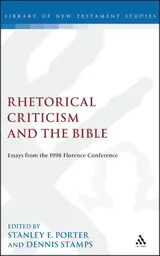

The Rhetorical Interpretation of Scripture: Essays from the 1996 Malibu Conference
in Library of New Testament Studies
Pages
394
Publisher
T&T Clark
Published
5/1/1999
ISBN-13
9780567532244
Rhetorical analysis has developed into an array of firmly established perspectives and practices within biblical criticism, offering a sophisticated engagement and analysis that biblical scholarship as a whole has still fully to appreciate. In particular, its value as a tool of ideological criticism is overlooked. These essays, embracing methodological explorations, practical applications and links to theological and historical analysis, provide the biblical scholar with an up-to-date portrait of this important discipline.
- Introduction: The Malibu Conference and the Ongoing Debate - Stanley E. Porter; Dennis L. Stamps
- Dedication: A Tribute to Thomas H. Olbricht - Richard T. Hughes
- Thomas H. Olbricht: Curriculum Vitae
- Part I - The Theory of Rhetoric and Biblical Interpretation
- Acting on the Center: An Interview on Rhetoric and Hermeneutics with Thomas H. Olbricht in the Wake of Hearing God's Voice - Erika Mae Olbricht
- Interpretive Unicity: The Drive toward Monological (Monotheistic) Rhetoric - J. D. H. Amador
- Rhetoric and Ideology: A Debate within Biblical Scholarship over the Import of Persuasion - Dale Patrick; Allen Scult
- Hallidayan Functional Grammar as Heir to New Testament Rhetorical Criticism - Gustavo Martin-Asensio
- Classical Rhetorical Criticism and Historical Reconstructions: A Critique - Thomas H. Olbricht
- The Contributions and Limitations of Greco-Roman Rhetorical Theory for Constructing the Rhetorical and Historical Situations of a Pauline Epistle - Duane F. Watson
- Part II - Rhetorical Interpretation Of Luke's Gospel And Acts
- The Preface to the Lukan Writings and Rhetorical Historiography - Kota Yamada
- Rhetorical Argumentation and the Culture of Apocalyptic: A Socio-Rhetorical Analysis of Luke 21 - L. Gregory Bloomquist
- The Lukan Account of Paul's Conversion and Hermagorean Stasis Theory - Jolivet Jr, Ira J.
- Part III - Rhetorical Interpretation Of Paul's Writings
- Paul as Epistolographer and Rhetorician? - Stanley E. Porter
- The Theological Rhetoric of the Pauline Epistles: Prolegomenon - Dennis L. Stamps
- The Self against the Self in Romans 7.7-25 - Glenn S. Holland
- Special Topics in 1 Corinthians 8-10 - Anders Eriksson
- Was Paul Angry? Derhetorizing Galatians - Lauri Thuren
Inner Books
This physical volume has several internal sections, each of which has been reviewed independently
- Introduction: The Malibu Conference and the Ongoing Debate by Stanley E. Porter and Dennis L. Stamps
- Dedication: A Tribute to Thomas H. Olbricht by Richard T. Hughes
- Acting on the Center: An Interview on Rhetoric and Hermeneutics with Thomas H. Olbricht in the Wake of Hearing God's Voice by Erika Mae Olbricht
- Interpretive Unicity: The Drive toward Monological (Monotheistic) Rhetoric by J. David Hester Amador
- Rhetoric and Ideology: A Debate within Biblical Scholarship over the Import of Persuasion by Dale Patrick and Allen Scult
- Hallidayan Functional Grammar as Heir to New Testament Rhetorical Criticism by Gustavo Martín-Asensio
- Classical Rhetorical Criticism and Historical Reconstructions: A Critique by Thomas H. Olbricht
- The Contributions and Limitations of Greco-Roman Rhetorical Theory for Constructing the Rhetorical and Historical Situations of a Pauline Epistle by Duane F. Watson
- The Preface to the Lukan Writings and Rhetorical Historiography by Kota Yamada
- Rhetorical Argumentation and the Culture of Apocalyptic: A Socio-Rhetorical Analysis of Luke 21 by L. Gregory Bloomquist
- The Lukan Account of Paul's Conversion and Hermagorean Stasis Theory by Ira J. Jolivet, Jr.
- Paul as Epistolographer and Rhetorician? by Stanley E. Porter
- The Theological Rhetoric of the Pauline Epistles: Prolegomenon by Dennis L. Stamps
- The Self against the Self in Romans 7.7-25 by Glenn S. Holland
- Special Topics in 1 Corinthians 8-10 by Anders Eriksson
- Was Paul Angry? Derhetorizing Galatians by Lauri Thurén